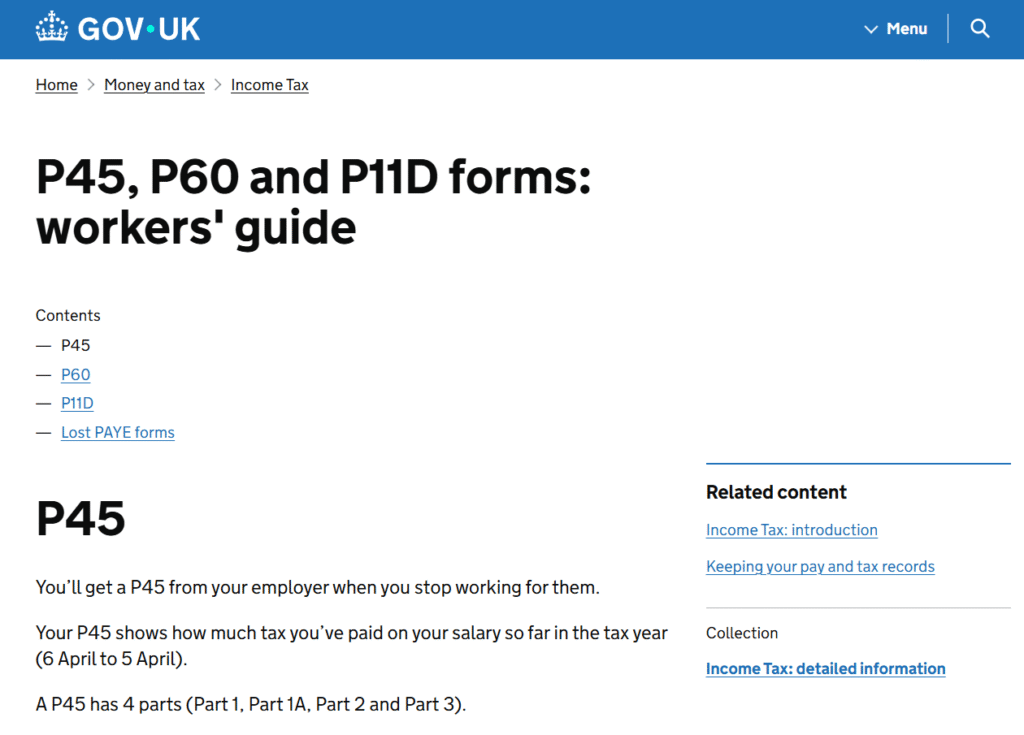HMRC P60 Form – Complete Guide to Your End-of-Year PAYE Summary, How to Use It, and How to Correct P60 Errors
Understanding the HMRC P60 Form
The P60 is one of the most important tax documents an employee receives each year. It summarises your total pay and tax for the entire tax year (from 6 April to 5 April). You receive a P60 if you are working for an employer at the end of the tax year on 5 April.
The P60 is essential for:
-
Proving income
-
Applying for mortgages
-
Claiming tax refunds
-
Applying for student finance
-
Updating benefits
-
Visa and immigration applications
-
Confirming tax paid to HMRC
-
Correcting tax code and PAYE issues
-
Universal Credit
-
Rectifying National Insurance gaps
This guide explains everything you need to know about the P60 — what it is, how to read it, how to get a copy, what to do if it’s wrong, employer responsibilities, RTI interactions, and how Audit Consulting Group can help.
ACG has you covered with expert assistance for understanding the HMRC P60 Form (HMRC P60 Form Assistance), one of the most crucial tax documents summarizing your total pay and tax for the year.
What Is a P60?
A P60 End of Year Certificate summarises:
-
Your total gross pay
-
Total tax deducted (PAYE)
-
National Insurance contributions
-
Statutory payments
-
Tax code used
-
Employer details
-
Student loan deductions
-
Pension contributions (where applicable)
You receive a P60 from your employer by 31 May following the end of the tax year.
Example:
-
Tax year ends: 5 April 2024
-
Employer must provide P60 by: 31 May 2024
You only receive a P60 if you worked for that employer on 5 April.
What the P60 Contains
A typical P60 includes the following information:
■ Your personal details
-
Name
-
National Insurance number
■ Employer information
-
PAYE reference
-
Employer’s company name
-
Employer’s PAYE office
■ Pay information
-
Total taxable pay
-
Tax deducted
-
Statutory payments
■ National Insurance contributions
Shows NI category and total NIC deducted.
■ Student Loan deductions
Plan 1, 2, 4 or postgraduate loan.
■ Final tax code
e.g., 1257L, BR, D0, K codes.
■ Workplace pension information (may appear on SSPAS statements)
This is your official annual PAYE record, used for many legal and financial processes.
Who Receives a P60?
You receive a P60 if:
-
You were employed on 5 April
AND -
You were taxed under PAYE
You do not receive a P60 if:
-
You left your job before 5 April
→ You receive a P45 instead -
You are self-employed
→ No P60 — you declare income in Self Assessment -
You receive only State Pension
→ No P60 from DWP -
You work as a contractor (CIS)
→ You receive CIS statements, not a P60
Why the P60 Is Important
The P60 is often required for:
• Mortgage applications
Proof of annual income.
• Tax refund claims
Evidence of tax paid and PAYE deductions.
• Student finance
Confirms annual earnings.
• Universal Credit & benefits
Verifies income levels.
• Immigration & visa applications
Required for Home Office financial checks.
• Pension entitlement
HMRC may compare P60 figures with NIC records.
• Employment disputes
Proof of income and deductions.
• Correcting tax codes
HMRC uses P60 data to fix tax errors.
How to Get Your P60
1. Request it from your employer
Employers must legally provide it every year.
It can be given in:
-
Paper form
-
PDF
-
Payroll portal download
Employers must keep P60 records for minimum 3 years.
2. Access it through your payroll portal
Most modern payroll systems allow you to download P60s, including:
-
Sage
-
Xero
-
QuickBooks
-
BrightPay
-
Moneysoft
-
Workday
-
ADP
3. HMRC cannot provide a copy of your actual P60
However, you can view your income information through your:
-
HMRC Personal Tax Account
https://www.gov.uk/personal-tax-account -
PAYE income history
HMRC can issue:
-
A statement of earnings,
which many lenders accept instead of a P60.
What If You Lose Your P60?
If you lose your P60:
-
Contact your employer
-
Request a duplicate
-
Employers can reissue via payroll software
If the employer no longer exists:
-
Contact HMRC for employment history
-
Provide evidence for mortgages or refunds
-
Consider a P60 reconstruction report (we can prepare this)
When You Do NOT Receive a P60
You will NOT receive a P60 if:
-
You left before 5 April (you get a P45)
-
You are self-employed
-
You only receive State Pension
-
You worked abroad under a foreign payroll
-
You are paid via subcontractor CIS
P60 vs. P45 vs. Payslip
| Document | When Issued | Purpose |
|---|---|---|
| P60 | End of tax year (5 April) | Summary of full-year tax & earnings |
| P45 | When leaving job | Tax & pay up to leaving date |
| Payslip | Each pay period | Breakdown of that specific payment |
How Employers Issue P60s
1. Generate through payroll software
RTI-compliant payroll systems automatically generate P60s after 5 April.
2. Distribute to employees
Via:
-
Email
-
Payroll portals
-
Printed paper copies
3. Keep records for 3+ years
HMRC may request P60s in audits.
Employer Legal Responsibilities
Employers must:
-
Issue P60s by 31 May
-
Ensure all information is accurate
-
Provide replacement copies on request
-
Keep payroll records for 3–6 years
-
Update tax codes based on P6/P9 notices
-
Reissue corrected P60s if errors are found
Failure can result in:
-
Penalties
-
Compliance checks
-
Employee complaints
How P60 Works With RTI (Real Time Information)
Before RTI (pre-2013), P60s were based on year-end reconciliations.
Under RTI:
-
Payroll information is sent every payday via FPS
-
End-of-year submissions are simpler
-
P60s are auto-generated from RTI data
-
Errors can be corrected with FPS adjustments
RTI has reduced discrepancies, but errors still occur and often require professional correction.
Reading Your P60 – Understanding Each Section
1. Employer PAYE reference
Important for tax refund claims.
2. NI number
Must match your employee record.
3. Taxable pay
Your annual earnings subject to tax.
4. Tax deducted
All PAYE tax collected during the year.
5. NI contributions
Employees’ National Insurance.
6. Student loan deductions
Plan 1, Plan 2, Plan 4, postgraduate.
7. Statutory pay
Includes:
-
Maternity Pay
-
Paternity Pay
-
Sick Pay
8. Final tax code
Reflects allowances, deductions, and HMRC updates.
If any part is incorrect, tax calculations may be wrong.
Common P60 Problems
For Employees
-
Wrong tax code used
-
Incorrect earnings reported
-
Employer failed to issue P60
-
Duplicate employment records
-
Student loan errors
-
Missing NI deductions
-
Wrong pension contributions
-
Incorrect employer name or reference
-
P60 not issued at all
For Employers
-
Payroll software errors
-
Incorrect RTI submissions
-
NI category mistakes
-
Missing employees on year-end reports
-
Incorrect benefits in kind (P11D) affecting P60
-
HMRC mismatch errors
Audit Consulting Group helps correct all of these issues.
Correcting a Wrong P60
For Employees
Step 1: Contact employer
Step 2: Explain issue
Step 3: Employer must reissue a “Corrected P60”
Step 4: HMRC updates PAYE records
For Employers
-
Amend payroll
-
Submit corrected FPS/EPS
-
Regenerate P60
-
Provide copy to employee
If employer refuses, HMRC may intervene.
How P60 Helps With Tax Refunds
A P60 is required for:
-
Overpaid PAYE claims
-
Work expense claims
-
Marriage allowance backdated claims
-
Uniform tax relief
-
Travel & mileage expenses
-
Emergency tax refunds
-
CIS interactions
HMRC checks P60 figures when calculating refunds.
Case Studies
Case 1 – Mortgage Application Declined
Client: Kevin, London
Issue: Employer name incorrect on P60.
Solution: We requested corrected P60; mortgage approved.
Case 2 – Emergency Tax Overpayment
Client: Emma, Manchester
Issue: P60 showed wrong tax code.
Refund: £890
Outcome: Corrected P60 allowed refund.
Case 3 – Missing National Insurance
Client: Margaret, Glasgow
Issue: P60 didn’t show correct NI.
Outcome: We corrected NI record with HMRC for pension purposes.
Case 4 – Employer RTI Error
A retail business had 11 incorrect P60s.
We corrected all RTI submissions and issued updated documents.
Frequently Asked Questions (FAQ)
Q1: Do I always get a P60?
Only if you are working for that employer on 5 April.
Q2: Can HMRC give me a copy?
No — only employer can issue P60, but HMRC can provide income records.
Q3: What if my employer refuses to issue a P60?
HMRC can force them to comply.
Q4: Can I get a P60 for self-employment?
No — P60 is only for PAYE.
Q5: Do pensioners get P60s?
Yes, private pension providers issue P60s.
The State Pension does not issue a P60.
Q6: I lost my P60 — what do I do?
Request a replacement from your employer.
Q7: The tax on my P60 looks wrong
You may be due a refund — we help correct it.
Official GOV.UK page:
https://www.gov.uk/paye-forms-p45-p60-p11d
P60 Form Preparation & Review Services Cost UK
Prepare and review P60 forms in the UK with professional payroll support. We help employers and employees ensure P60 details are accurate for tax and income verification. Our P60 services support HMRC compliance and financial documentation needs.
Service Cost Estimation
Select the service category below to calculate the estimated cost of either accounting & tax services or forms and submissions.
Select Required Services / Forms
Select one or more services/forms to receive an accurate cost estimate. You can adjust your selection at any stage.
How would you like to engage our services?
Please select whether you require a one-off service or ongoing monthly support.
Contract Duration
Your cost estimate
Apply now and get 10% OFF
Submit your request today and receive an exclusive 10% discount on your selected service.
All prices are estimates. To receive a personalised quote, please fill out the form or contact us.
Ready to get started?
Get professional support from experienced UK accountants






